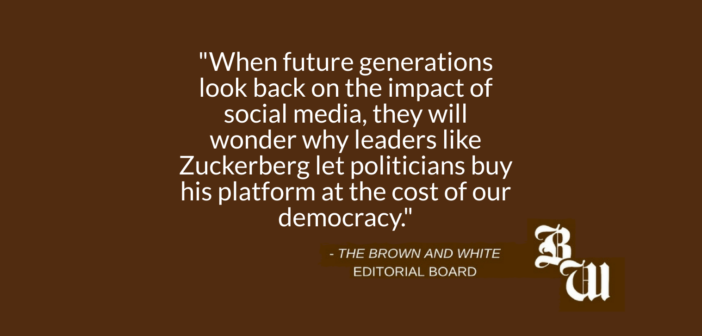“We believe political messages should be earned, not bought,” Twitter CEO Jack Dorsey said following Twitter’s ban on political advertisements.
However, Facebook CEO Mark Zuckerberg argues the contrary. With expected earnings of up to $400 million from political ads in 2019 alone, Zuckerberg’s supposed defense of free expression is under scrutiny.
Although Twitter profits significantly less from political advertisements, with just $3 million in earnings, the decision to ban the advertising was made to lessen the threat that political advertisements pose to democracy.
While both Twitter and Facebook were established in the early 2000s, the seemingly endless pool of information floating in the digital realm has become the new normal. According to a 2018 survey, two-thirds of American adults use social media as a primary news source.
Social media has revolutionized how we consume and spread opinions and news, but it is not all for the better.
Since their establishment, Facebook and Twitter have both developed algorithms that follow the relevance model and show users the posts and news they statistically prefer to consume.
Politicians have embraced the influence of social media in their advertising campaigns. Since January, President Trump’s re-election campaign has posted more than 2,000 advertisements on Facebook that include the word “invasion,” to strategically sway voters’ perception of immigration.
Democratic candidates, such as Elizabeth Warren, have spent up to $3 million on Facebook advertisements, targeting demographics based off of their campaign appeals.
As algorithms work to present users with information they prefer to consume, divisions among users are amplified.
According to a Pew Research Center study, Americans have become “increasingly partisan” in their views. As algorithms and feeds shape users’ perspectives, finding a middle ground becomes more difficult.
When analyzing the connection between social media algorithms and usage, the study found that “The algorithms that drive participation and attention-getting in social media, the addictive ‘gamification’ aspects such as likes and shares, invariably favored the odd and unusual.”
Dorsey’s decision to ban political ads on Twitter is a step toward change, but former President Barack Obama still sees a fundamental side effect of the increasing use of social media.
“One danger I see among young people is that they think the best way to make change is by (judging people),” Obama said at the third Obama Foundation Summit on Oct. 29. “That’s not activism. That’s not bringing about change.”
With powerful corporate leaders like Zuckerberg failing to act, users must post and share wisely. While social media provides a common ground for citizens to share perspectives, the use of social media as a primary source of information amplifies divisions and narrows the middle ground.
Social media has rewritten how we document history. In 2010, Twitter donated its digital archive of tweets to the Library of Congress. When future generations study the social media boom, they will study this critical trial period and reflect on what they would have done differently, with the benefit of retrospect.
As leaders debate the threat of social media, users must proactively seek out primary sources of information from more than just one perspective. In a time where we have been given ample platforms to share our differences, it seems as though we are moving backward when it comes time to work through them.
Twitter, Facebook and other social platforms are valuable and have helped to raise awareness and amplify voices that otherwise may not be heard.
With 2.38 billion Facebook users and 330 million Twitter users, there are more voices writing history than ever. With this in mind, future generations will look back at leaders like Zuckerberg and Dorsey and measure the side effects of their platforms.
As more voices gain power, corporate leaders such as Zuckerberg can no longer leave themselves out of the conversation.
Although Zuckerberg argues, “in a democracy, I don’t think it’s right for private companies to censor politicians or the news,” removing himself from the equation is not a logical option either.
With expected profits of $400 million from political ads in 2019 alone, Facebook’s responsibility to act is no longer optional. Providing politicians with the benefits of the algorithm and access to swayable voters, Zuckerberg plays a key role in censoring politicians.
When future generations look back on the impact of social media, they will wonder why leaders like Zuckerberg let politicians buy his platform at the cost of our democracy.






Comment policy
Comments posted to The Brown and White website are reviewed by a moderator before being approved. Incendiary speech or harassing language, including comments targeted at individuals, may be deemed unacceptable and not published. Spam and other soliciting will also be declined.
The Brown and White also reserves the right to not publish entirely anonymous comments.